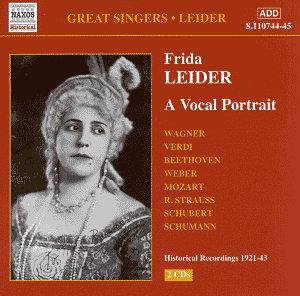The most prominent of all inter-War Wagnerian sopranos,
Leider has seldom, if ever, really lacked for reissues. Assiduous
– and even more casual – collectors will already have her Preisers
– acoustic and electric. Pearl has some significant material and
the list of other companies who have some of her discs in their
catalogues is a deservedly long one: Claremont, ASV, Danacord,
EMI – of course – Memoir Classics, Music Memories. I’m sure there
are and will be many more. This is terra cognita as far as great
gramophone classics go but it might be instructive to concentrate
on the acoustics which haven’t, by and large, received quite the
plaudits of her famous series of Wagnerian discs of 1928-31.
The Oberon extract displays many of her great
virtues; declamatory, oratorical power, an imperious command.
In purely tonal and technical terms this demonstrates a fully
supported bottom compass, as well as a mezzo-like depth and colour
in the middle-to-bottom of her range; added to which the more
florid technical demands are almost non-existent to her. Senta’s
Ballad is sustained, from top to bottom, with emotional power
and vocal agility of the highest order. The Wesendonck-Lieder
– late acoustics from April 1925 - are notable for their emotional
generosity without any hint of specious embellishment. The great
Wagnerian discs are here, as well as the earlier, slightly less
impressive acoustics (though in Leider terms that is very much
a matter of infinitesimal degree). There are also some items one
would not immediately correlate with her name – Gluck, Verdi and
the late lieder discs of 1943. The Gluck is highly romanticised
and deeply impressive on its own terms (tonal effulgence and immense
generosity). The Verdi – Il Trovatore, Aida and Don Carlos – shows
her off the beaten track and (in the case especially of O don
fatale) in notably excellent voice. The Fidelio extract (Abscheulicher,
wo wilst du hin?) is marginally less successful than elsewhere;
a sense of rectitude informs it and rather dampens ardour. But
her Donna Anna aria is splendidly forthright with prominent portamenti
and a striking command embedded in the impersonation.
Where this double set scores highly is in collating
the Schubert-Schumann lieder discs she recorded with the indefatigable
pianist Michael Raucheisen. These are rather less well known than
the Wagner that surrounds them. Even though they are late Leider
(November 1943) they still make for fascinating listening. She
began the lieder career primarily as a result of her Jewish husband,
Rudolf Deman, having had to leave Berlin for Switzerland in 1940.
Deman, an excellent quartet leader with his own eponymous group,
was also leader of the Staatsoper in which dual role, despite
his wife’s obvious prominence, he was doubtless a multiple affront
to the Nazis. She then pretty much gave up the stage and concentrated
on a career as a recitalist, making repeated visits to Switzerland
to be with Deman. Those who find her an acquired taste in lieder
singing may well point to the first of the titles presented here,
Erlkönig (though the matrix numbers indicate that
Schumann’s Marienwürmchen was the first to be recorded).
It’s not a bad performance and of course - as far as the voice
goes - it’s preferable to Therese Behr-Schnabel and her husband
Artur in their recording of it. But there are rhythmic and other
italicised idiosyncrasies, which will not be to all tastes. Auf
dem Wasser zu singen is, perhaps because easier, much
better. I liked Marienwürmchen – a lightness with
splendid crescendos and well scaled – Raucheisen the guiding spirit
here. She scales down her voice for Meine Rose – though
it’s true that the voice has begun to wear and age – and sings
with sympathy and great delicacy.
The selection is judicious, mixing classics with
unexpected repertoire, a fine corpus of acoustics and the late
lieder discs. They cover over twenty years in Leider’s performing
life and it’s inevitably the case that one should be able, equally,
to trace a hardening and coarsening of her vocal resources. Nevertheless
this is a self-recommending disc and I’ve not even mentioned the
words "Melchior" and "Tristan Act II". You
just don’t need to.
Jonathan Woolf



